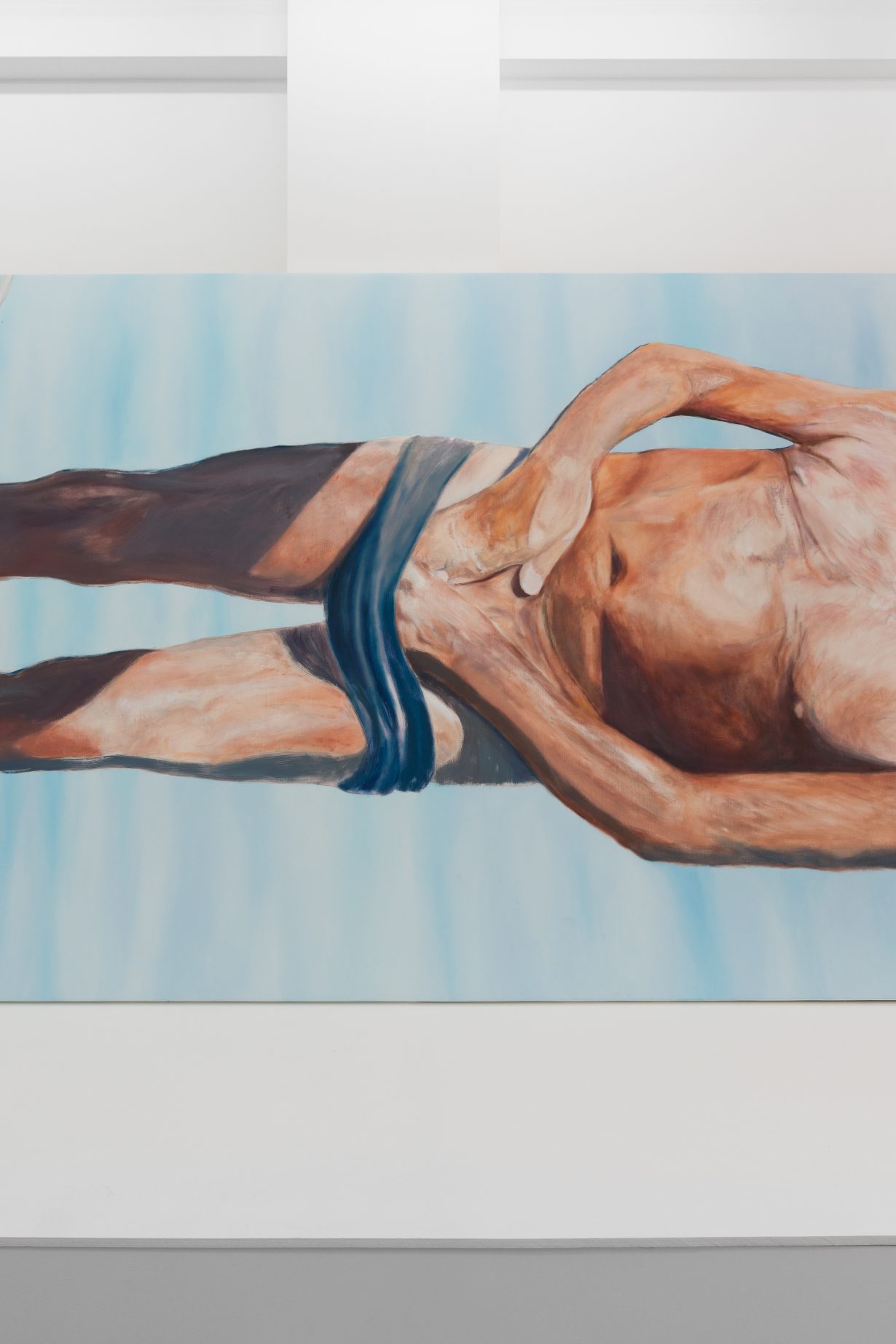A message about nation-states and independence can be found where you least expect it
It’s evening, and Beyoncé and Jay-Z are taking a dip in a milky blue lagoon, surrounded by bare and craggy hills. Behind the couple, a little way off, the heads of three other bathers are just about visible, although their features are fogged by the steam that rises from the surface of the water. At the shoreline stands a figure in hi-vis overalls attending to a huge circular lamp, which beams lemony light across the lagoon like a proxy sun. Bright as it is, it can’t compete with the wattage of the superstar performers’ smiles, their luminous joy at being here, now, together – looking so crazy in love.
This is Hamishi Farah’s painting Beyoncé and Jay-Z (The Love of Things) (2023), a slightly sickly-looking exercise in photorealism that’s hung near the entrance to the Somali-Australian artist’s tight, funny and politically barbed show of four new works. Almost nothing in the way of contextual information accompanies this canvas, but a Google Image search reveals that it’s based on a photo that Beyoncé posted to Instagram in 2014, during a trip with her husband to a geothermic spa in Iceland. Are we being asked to attend to the contrast between the tourists (Black American members of the 0.1%, whose lyrics often hymn unbridled capitalism) and their vacation spot (a small, overwhelmingly white, Nordic island-nation, which experienced a systemic banking collapse during the late 2000s), and then read the work as meditation on race, neoliberalism and the idea of alien visitation, or even invasion? Looking at the grinning lovers, I’m reminded of their duet Apeshit (2018), which contains the line “I’m a Martian, they wishin’ they equal”. I get to thinking of Iceland’s Viking past, and its peaceful, mildly social-democratic present; of internet conspiracy theories about Beyoncé and Jay-Z belonging to a shadowy group of global puppeteers known as the Illuminati, and the title of the rapper’s best-known track, Empire State of Mind (2009).

At the far end of the gallery hangs Statement from Howard Kennedy LLP on behalf of their client regarding the colonisation and reappropriation of the physical body associated with Italian fashion designer Roberto Cavalli (2023), a work in the form of a legal document, drafted by a law firm at Farah’s behest. Its purpose is to declare a sovereign state located in the ‘territory’ of the eighty-two-year-old couturier’s person, without his prior knowledge or consent, ‘while endeavouring to safeguard and uphold [his] inherent dignity, integrity, and inviolability’. This may be legally possible (I’m no lawyer), but it’s also patently absurd, although no less so than any of the territorial claims staked by European powers during their rush to colonise the Earth. Nearby, the 4.55m-high painting Roberto Cavalli (2023) is propped on its side against a sloping white ramp, as though it were awaiting wrapping and shipment. The canvas depicts Cavalli wearing nothing but a pair of skimpy swimming trunks, into which he plunges his hands. Squinting out at us, his wrinkled, sagging skin slathered in semenlike sunscreen, he bears an unfortunate resemblance to a lifelong public masturbator who at this late stage in his career can no longer be bothered to conceal his frantic tugging beneath a raincoat. So much for Farah upholding his ‘inherent dignity’.

The painting is based on a 2013 long-lens paparazzi photo of Cavalli on his yacht, hosing down after a swim. If we detect a strong element of body shaming, and some troubling issues around consent, this may be Farah’s point. In the same year the paparazzi shot was taken, the couturier published a digitally manipulated image of Beyoncé wearing one of his gowns, in which the singer’s celebrated curves were photoshopped out. Many commentators saw this as an attempt to make her physique confirm to a white standard of beauty, and as a denial of a Black woman’s bodily sovereignty. In contrast, Farah’s painting of Cavalli doesn’t deviate from its source. He’s presented as he is: a pale, frail male.
Opposite Roberto Cavalli hangs Live-in Whale instead of Nation State idea (2021–23), a painting based on a stock photo of a breaching hump-back whale. One way in which new states gain legitimacy is through their recognition by neighbouring powers. Will this ocean-dwelling leviathan – this alien intelligence – give the nod to Farah’s attempt to colonise the couturier? Maybe not (what do whales care for land claims?), although I suspect that Bey and Jay might well approve.
Hamishi Farah at Arcadia Missa, London, through 30 August
